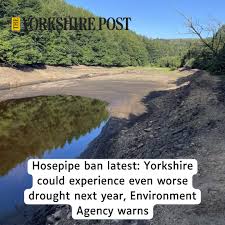
Introduction
The recent implementation of hosepipe bans across various regions in the United Kingdom has garnered significant attention. As climate change leads to increasingly erratic weather patterns, the importance of conserving water becomes paramount. This hosepipe ban not only addresses immediate water shortages but also highlights the broader implications of environmental sustainability and the necessity for responsible water usage.
Reasons for the Hosepipe Ban
In August 2023, several water companies in England announced hosepipe bans due to prolonged periods of dry weather, which resulted in low water levels in rivers and reservoirs. According to the Environment Agency, parts of England have experienced the driest year since records began in 1891, raising alarms about the availability of water supply during the summer months. Companies like Thames Water and Southern Water implemented these restrictions, aiming to curb excessive water use and ensure available resources are conserved for essential needs.
What Does the Ban Entail?
The hosepipe ban prohibits the use of hoses for activities such as watering gardens, washing cars, and filling ponds or swimming pools. However, it does allow for specific exemptions, including the use of hoses for keeping animals hydrated or for health and safety reasons. Violating the ban can result in fines of up to £1,000, which underscores the seriousness with which authorities are treating water conservation.
Public Response and Compliance
The public response to the hosepipe ban has been mixed. Many residents acknowledge the necessity of the ban given the prevailing conditions and are willing to adapt their behaviours. However, some express frustration, particularly farmers and businesses that depend on regular water supply for their livelihoods. Water companies have encouraged the use of water-saving techniques and provided advice on how to maintain gardens and landscapes without using hosepipes, highlighting the importance of community cooperation during this challenging period.
Conclusion
The hosepipe ban serves as a critical reminder of the pressing issues surrounding water scarcity and environmental sustainability in the UK. As climate change continues to pose challenges, residents and policymakers alike must engage in thoughtful discussions about water resources to ensure future availability. Experts predict that hosepipe bans may become a recurring measure, particularly if dry spells persist, underscoring the urgent need for innovative water conservation strategies and public awareness campaigns. The significance of this ban extends beyond just a limitation on water use; it reflects a collective responsibility to manage an essential resource wisely.
You may also like

Marie Hobinger: A New Force in Environmental Activism

Recent Developments at Thames Water: Challenges and Initiatives
